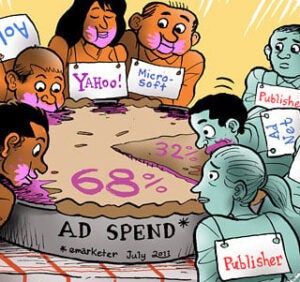 “Data Driven Thinking” is written by members of the media community and contains fresh ideas on the digital revolution in media.
“Data Driven Thinking” is written by members of the media community and contains fresh ideas on the digital revolution in media.
Today’s column is written by Ed Carey, VP Demand Sales at The Rubicon Project.
At this stage of the programmatic growth story, almost every business in the chain of marketers, agencies, platforms, and publishers has come up with a strategy to exploit the tide of automation changing how advertising is bought and sold. That naturally flows into new hiring strategies, too, because automation doesn’t obviate the need for people.
But while the industry has paid plenty of attention to how the buy-side marketers and agencies must adapt their businesses and employee skill sets, it isn’t quite as far along when it comes to understanding how the sell-side publishers and platforms are hiring their sales teams of the future.
Just as buyers need audience-buying experts adroit at operating sophisticated integrations and platforms, publishers need people to sell the programmatic inventory, platforms, data, and tools. And companies recognize this: Industry job listings are full of ads for programmatic publishing, as well as for ad network, platform, data, and mobile sales jobs.
But many of these hiring firms are flummoxed about how to recruit new hires with the skills to target emerging customer channels, such as trading desks and Demand Side Platforms.
Sell-side hiring managers struggle to write job descriptions for these programmatic-sales positions because they’ve never done so before. The huge ranks of digital-sales people who want to pivot into programmatic-sales jobs before it’s too late face a similar situation, with no idea where to start their search, what hiring managers are looking for, or how to apply their experience selling transactional media to customers oriented toward platforms and APIs. Buyers, sellers, operators, executives, and recruiters all are new to the function of programmatic selling. In other words, everyone’s in the same boat.
Jocks Vs Geeks
For those recruiting or seeking programmatic-sales jobs, it may help to view the talent market across the industry spectrum of legacy skills. This talent spectrum spans media sales “jocks” to business development/operations “geeks.” Those who sell media are corporate athletes: popular with clients, quick to entertain and sell solutions by telling stories to drive pipelines of transactional, guaranteed ad deals. Meanwhile, dev-ops folks are cerebral, practical in their approach, accustomed to the enterprise adoption cycles, ambiguity, systems operations, and emerging technologies.
For programmatic-sales jobs, you ideally need a mix of both personalities. The most suitable candidates are media-sales people who are intellectually motivated by programmatic disruption – analogous to jocks who love reading – or operators who have the charisma and drive to enable customers while making money for themselves and their employers, comparable to geeks who love dunking.
There are a few of these students in every class, but not many. Asking candidates about their passions will reveal where on the spectrum they fall. And in this job market, a jock’s or geek’s willingness leave a steady job to sell something they know little about to customers they’ve never met is a major qualifier of a good candidate.
AdExchanger Daily
Get our editors’ roundup delivered to your inbox every weekday.
Daily Roundup
When recruiting for programmatic sales positions, don’t expect to find anyone who has the specific experience you want. In any given region, only a few of these subject experts exist and they’re usually highly satisfied workers blazing new paths at leading ad-tech employers with installed clients. My friends at the DSPs and trading desks tell me there are about 100 programmatic sales organizations, including publishers, exchanges, data and other companies. So, any way you look at it, your candidate pool is small.
Skill sets for programmatic sellers are different than established media sales or business-development folks. Listening for customer pain and pitching solutions is outmoded; “solution fatigue” is rampant in our industry.
Instead, the goal of programmatic-sales jobs is to challenge advertisers to adopt new processes or behavior. (“The Challenger Sale” by Matthew Dixon is the modern sales playbook for coaching clients how to buy, not what to buy.)
Hiring Credibility
Coaching customers to modify their behavior requires, above all else, credibility. Buyers include product, tech, and operations people who will only work with credible sales partners. So the programmatic sales person you want to hire (or you want to be, if you’re a job seeker) must be credible enough to ask buyers to change behaviors and make big bets on the path to automating their business. To sell successfully, publishers and platforms will need to hire credible jocks who can divert media budgets into programmatic products, as well as credible geeks who can translate the benefits of new technologies to marketers.
All this, of course, may be easier said than done. The challenges are numerous. Sometimes nobody applies for your programmatic-sales job because they can’t understand your job description. If you’re a job seeker, maybe employers won’t call you because you’ve only asked for RFPs your whole career. Jocks often lack Real-Time Bidding experience. They earn oversized salaries coddling media planners, but stutter when talking about agency trading desks. And they usually want to manage teams, which is an issue because programmatic-sales teams don’t (yet) widely exist. Meanwhile, geeks may not know any advertising buyers or know how to work a conference, and usually have never before been compensated based on revenue goals. And, for the most part, geeks don’t want to be jocks.
When in doubt, map your talent needs according to your customers: If you need to sell an RTB product to an ad agency, hire a jock who loves reading. If you need to sell a platform to a DSP, hire a geek who loves dunking. But do not hire an overpaid jock who can’t read, or a geek who can’t dribble the ball in front of customers.
There are a limited number of companies from which to recruit. Start by looking at the partner pages of top ad-tech companies, where you will inevitably find dozens of partners. Widen your search profiles to include business development, channel, partner management, performance sales, operations, and client services with 10 years minimum experience with an ad tech, ad network, or product-driven company. Next, tap into your networks to find the jocks who love reading and are serious about getting a programmatic-sales job (and who may be willing to take a pay cut for the chance). Just like in 2006, when the smart sellers all went to work for ad networks, the 2013 tide of passionate sales people are pursuing firms committed to programmatic selling, platforms, and automation.
Compensation is different for the jocks and the geeks because while the jocks have been earning big commissions on guaranteed, transactional, negotiated deals, the geeks have been getting paid – usually less than their sales peers – based on managed business or KPIs. To reconcile this, jocks should expect balanced cash flow with commission caps plus KPI metrics. Geeks should expect to make more upside for their efforts, but will need to adjust to client service and revenue accountability. (Sorry, blaming the product doesn’t go very far in sales!)
Here is a summary checklist of what to look for when hiring programmatic sellers. Candidates must be:
- Intellectually motivated by programmatic, RTB, platforms, automation, and industry disruption
- Credible enough to change customer behavior by challenging clients to improve
- Either a media-sales jock who loves to read or a dev-ops geek who can dunk the ball
- Willing to pivot away from an assumed career path to contribute to industry change
- Flexible on compensation, targets, and titles in order to be part of this disruption.
Follow Ed Carey (@EdCarey) and AdExchanger (@adexchanger) on Twitter.













